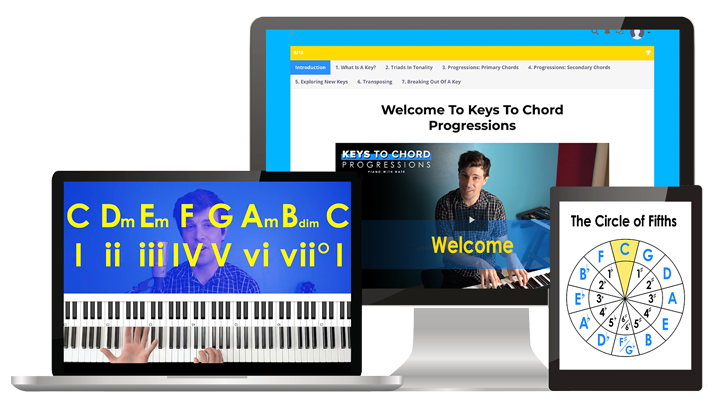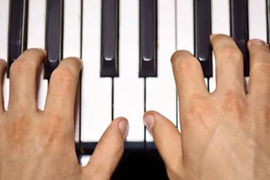"Music Theory" that just makes sense
Master chord progressions to play any song, adapt to any key, and create your own masterpieces

Don't let the fear of complex theory hold you back any longer!
Join me in Keys to Chord Progressions and unlock your potential to become the musician you've always dreamed of.
Learn at your own pace with full lifetime access to all of the course materials, plus you'll be protected by a 30-Day Money-Back Guarantee!

- Lisa N
"Finally understanding keys has been amazing. My husband has been a musician for 40 years and I am finally able to play along with him!
Your explanation of the circle of fifths is very understandable and actually inspiring where as prior to this course to me was a foreign language. Thank you so much for your inspirational teaching method."
"Keys to Chord Progressions very helpful. I started playing piano about a year and a half ago. I am in my late 40's, but I had no interest as a child to learn music.
This course explains why certain songs can hook you in simple ways. The chord progression exercises are more helpful than playing scales repeatedly!"


Calling all adults who once embarked on a classical piano journey but left it behind in the past!
Rediscover your musical passion with a fresh approach that resonates with your love for pop and rock tunes.
These songs are best learned and understood the way they were written: from a chord-based perspective and without traditional sheet music.
If you find yourself among the countless adults who have recently started on this path, you're undoubtedly excited by the possibilities of this new approach. (Why didn't my childhood teacher ever show me this??)
This world of chord songs can also be a bit overwhelming for those accustomed to the concrete handholds of notes on a staff. When you're not a robot glued note-by-note to a score, understanding the bigger picture becomes the key to progress.
Yes, we're talking about that dreaded "music theory."
But fear not! Music theory—especially the important parts—isn't as complicated as it seems. Really, it's not.
That's where I come in. I'm Nate, and over the last few years, I've had the privilege of speaking with thousands of people learning to play piano on YouTube.
I've noticed that certain questions come up again and again:
- How do I know what chords will sound good together?
- What does it mean to be "in a key"?
- How can I make a song higher or lower to fit better with my singing voice?
With just a few foundational ideas, we can answer these questions and more, such as:
- Can you write a sad song using only major chords?
- How can I improve at learning songs by ear?
- How can I "break the rules" to make a song sound exciting and surprising?
- Why does a particular sequence of chords evoke strong emotions?

In the last decade, I've guided hundreds of private students through questions like these, witnessing the incredible moment when music begins to "click" for them.
Let's get real: much of "music theory" does more to confuse than empower. While it may impress snobby music scholars in universities, it doesn't really help most piano players who simply want to enjoy playing their favorite songs.
I've spent my life studying music theory, but only a few concepts were game-changers that transformed my musical journey and shaped the piano player I am today.
So I created a course to cut through the noise and share these key concepts with aspiring pianists like you, hungry to enhance their skills and unlock new possibilities on their musical path.

Introducing:


The ultimate guide to understanding and mastering chord progressions for beginner and intermediate piano players.
In Keys to Chord Progressions, I've stripped away the unnecessary jargon and complicated corner cases. What remains are the indispensable tools you can immediately apply to understand what makes songs work.
The backbone of almost all rock and pop music is the sequence of chords it follows—the chord progression. It's the canvas upon which the rhythms and melodies of songs are painted.
By understanding chord progressions, you'll speak the language of music. This knowledge will enable you to:
- Learn songs by ear faster
- Develop a deeper appreciation of music
- Transpose songs into new keys effortlessly
- Write your own compelling and memorable songs
To truly understand chord progressions, you first need to grasp the concept of keys—the specific collections of notes defined by the scale used in a song. Keys provide the "secret sauce" of music, infusing notes and chords with certain emotional qualities that skilled musicians use to communicate with their listeners. Keys to Chord Progressions starts by demystifying keys and takes you on a transformative journey toward mastering the art of songs.
Here's what's waiting for you inside Keys to Chord Progressions:

What Is A Key?
In this foundational lesson, we begin to explore how scales relate to the idea of a "key." Discover how a key works and unlock its magical power to infuse notes with new emotional qualities.

Triads In Tonality
Almost all music can be boiled down to the basic building blocks of chords (specifically, triads). Here we learn the universal way that chords fit into a key. This is vital for knowing which chords will work well together.

Primary "Destination" Chords (Chord Progression Construction)
Even when you know which chords sound good together, you can't simply throw them into a song and expect to captivate your listeners. Learn how to use chords to tell a story – some chords play more pivotal roles than others!

Secondary "Path" Chords (Chord Progression Construction)
Dive deeper into the art of crafting chord progressions by adding depth and color with secondary chords in a key. These chords act as scenic routes that enhance the journey of your musical story. In this lesson, I'll provide tried-and-true rules of thumb to help you know which chord you should change to next.

Exploring New Keys
Learn new scales that will allow you to learn songs quicker, and to transpose them effortlessly. Rest assured, this course isn't about mindlessly running two-handed scale exercises in all 12 keys. Instead, we focus on the universal formula for major scales and start by truly mastering just three keys.

Transposing
Once you understand a few scales and keys, transposing (changing keys) becomes a breeze. You can play any song in the perfect register for your voice. I'll guide you through a reliable transposing process and provide exercises to sharpen your skills.

Breaking Out of a Key
Rules are meant to be broken. In this lesson, we explore chords that don't fit within the key of the rest of the progression. But not just any random chord will work! I'll break down reliable techniques for skillfully deviating from a key, creating surprising and exciting results.

Secondary "Path" Chords (Chord Progression Construction)
Dive deeper into the art of crafting chord progressions by adding depth and color with secondary chords in a key. These chords act as scenic routes that enhance the journey of your musical story. In this lesson, I'll provide tried-and-true rules of thumb to help you know which chord you should change to next.

When you sign up for Keys to Chord Progressions you get:
- 7 Video lessons that build the theory foundation step by step.
- A printable PDF workbook with exercises to help you digest the concepts in the videos.
- One year of email access to me to answer any questions about the course material that might come up. I want to guarantee you'll never feel stuck!

Answers To Your Questions
| How is this course different than Piano Chord Breakthroughs? |
Piano Chord Breakthroughs is my technique course, and this is my theory course. Here, rather than zooming into the mechanical and rhythmic aspects of playing piano, we look at the big-picture underlying the structure of songs.
| Do I need to practice scales? |
Keys to Chord Progressions is not about running scales until your fingers fall off! We will look at the structure of major scales to understand how they work and how to use them, but we will practice just a few keys. Further scale study and practice are encouraged - and I provide resources for this - but it is not the focus of this course.
| Do I need to read notes? |
Nope. There are no traditional "notes on the staff" sheet music in Keys to Chord Progressions!
| What if I'm a total beginner: |
Give it a try! This course starts with fundamentals, and you can go at your own pace. I also offer email support so you can reach out if you feel stuck.
However, the course does assume very basic knowledge, so if you are entirely new to piano, you will need to learn some basics like note names and how to find those notes on the keyboard.
A motivated beginner can learn those quickly (search "first piano lesson" on YouTube) to prepare for Keys to Chord Progressions.
Finally, there is a 30-day money-back guarantee, so you are covered in the unlikely event you start the course and feel it is over your head.
| What about intermediate and advanced players? |
The sad thing is that many experienced players don't know these foundational ideas, making their piano journey more difficult than it needs to be.
If you are experienced and wondering if this course is for you, I suggest taking a look at the contents above to assess if the information in this course will be new, or review.
Again, there is a 30-day money-back guarantee, so if you realize you're not going to get enough out of the course, no sweat!
| What if I need help/have questions |
I never want my students to feel stuck, lost, or confused. When you purchase Keys to Chord Progressions, you get a full year of email support from me to clarify any questions about the course material.
Don't let the fear of complex theory hold you back any longer!
Join me in Keys to Chord Progressions and unlock your potential to become the musician you've always dreamed of.
Learn at your own pace with full lifetime access to all of the course materials, plus you'll be protected by a 30-Day Money-Back Guarantee!

- Bjorn K
"I wanted to understand the music science behind your arrangements and not just memorize them.
I found your explanations so clear, logical, and easy to follow, that things I thought I knew, I now understand."
"I found the Keys to Chord Progressions course really valuable. Even though I already can read music, I didn't really understand keys and how to build a song.
I'm excited to use this new information to help me better play along when I play with friends. Understanding keys and chord progressions will help me learn new songs much more quickly. I learned something new in each lesson and I recommend this course. Thanks Nate!"


